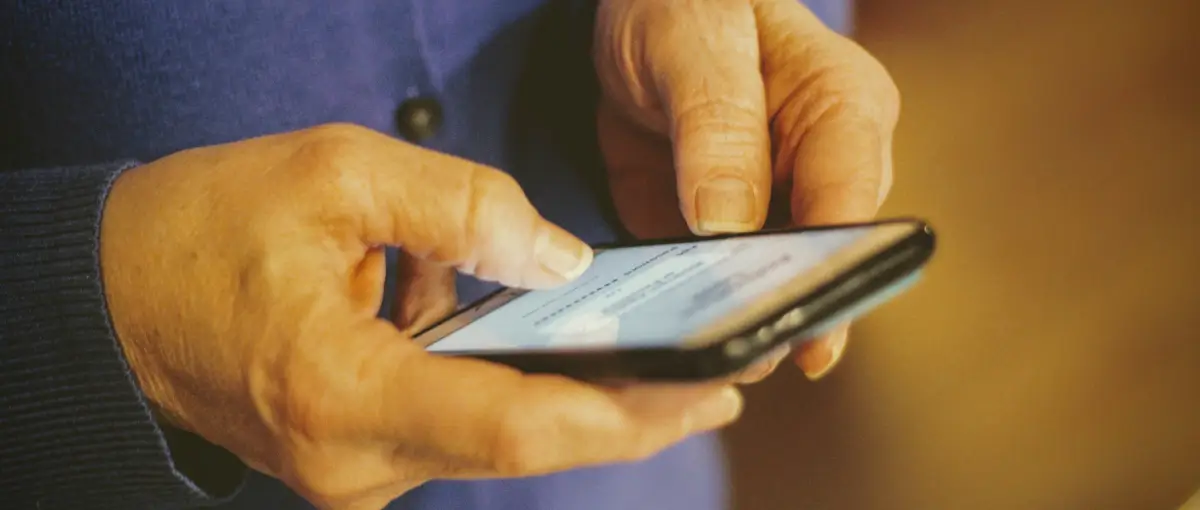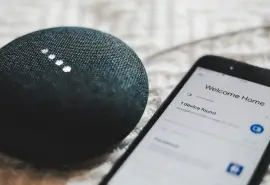Gone are the days when parents have to rely on landline phone calls, left-behind sticky notes, or make calls to other parents just to check in on their kids. In today’s digital world, technology has changed the way parents stay connected to their children. Whether it’s tracking their location, monitoring their social media activity, or sending a simple text to check in, keeping tabs on kids has never been easier.
With new technology constantly emerging, from tracking apps, to smart-home cameras, to physical tracking devices, some parents choose to monitor their children’s activities and whereabouts more closely than ever before. As experts in data security and recovery, we were curious to learn more about this modern parenting trend.
To find out where American parents use technology to keep track of their kids the most, we surveyed 2,009 parents across the country about how they use technology to monitor their children. Read on to find out where in the country tech-savvy parents use monitoring devices in their parenting most and how parents track their kids most in your state.
Key Findings
- California, New Jersey, and Tennessee are the states where parents digitally monitor their kids the most.
- Nebraska, Idaho, and Minnesota are the states where parents digitally monitor their kids the least.
- 52% think that heavily monitoring children results in rebellious or risky behavior.
- 65% check in with their child more than their parents checked in on them.
- One in three track the location of their adult children.
The States Where Parents Keep Tabs on Their Kids Most
From the moment their children are born, parents take on the responsibility of tracking their children’s well-being by making sure they’re eating balanced meals, performing well in school, and engaging in good activities. This constant monitoring is a pattern many parents follow as their children grow, but as kids mature and become more independent, some parents shift their approach.
While younger kids require more supervision, older kids often gain more freedom, and for some parents, the need to track their every move becomes less of a priority. Instead, they focus on encouraging independence and offer guidance from a distance.
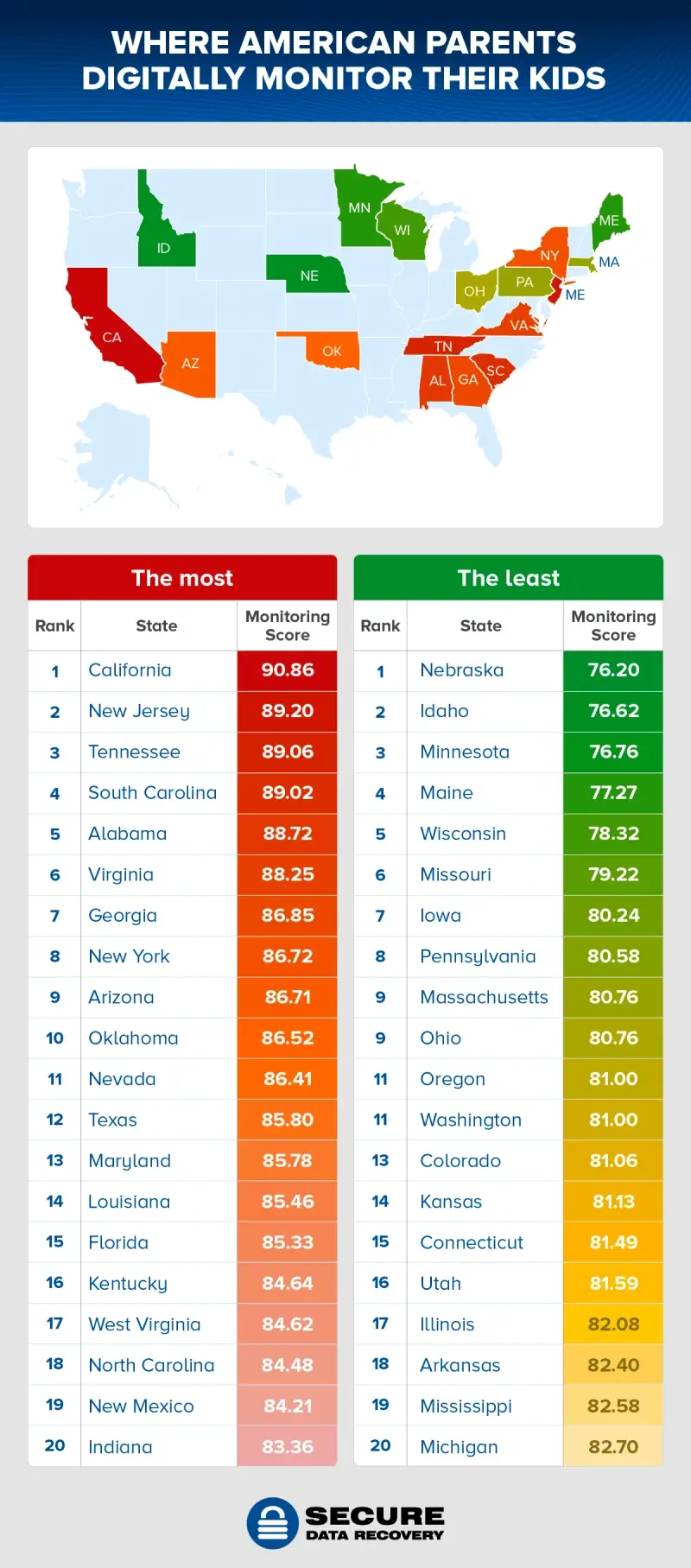
However, for others, the habit of tracking persists, with the help of technology that allows them to stay connected 24/7. Whether it’s tracking their child’s location, monitoring their online activity for safety, or using a doorbell camera to know who’s visiting, technology offers a way to maintain that connection, even as their children grow more independent.
Keeping tabs on their kids is one of the most important things parents do, from making sure they’re eating balanced meals and performing well in school, to ensuring they’re engaging in good activities and more.
With a neverending list of things to monitor, for parents, keeping track of their kids can seem like a full-time job, especially if they have multiple children. To ease the burden, many tech-savvy parents rely on technology to help.
From using technology devices to track their child’s location, reviewing their online activity to make sure they’re staying safe, or using a doorbell camera to monitor who they’re having over, digital devices have the ability to keep parents connected 24/7.
With so many tools available and different parenting methods out there, some parents rely on digital tools in their parenting more than others. Parents in California, New Jersey, and Tennessee digitally monitor their kids the most.
These monitoring behaviors are why parents in these states ranked so highly on the list:
- In California, parents are most likely to check in with their kids while they’re at school, with 12% saying they do. People in the West Coast state are also most likely to track their child’s location in an effort to motivate them to behave.
- In New Jersey, parents are most likely to use an AirTag or other GPS device to track their kid's location and set an alert to notify them if their child has left a certain area.
- In Tennessee, parents are most likely to check in with their kids while they’re at work.
However, not all parents feel the need to rely on such technology, in fact, 52% think that heavily monitoring children results in rebellious or risky behavior. Parents in Nebraska, Idaho, and Minnesota are least likely to digitally monitor their kids. For some parents, the idea of constant surveillance might feel intrusive or unnecessary, and so they may skip heavy digital monitoring.
Overall, the balance between privacy and protection is a growing challenge as new digital monitoring methods come out and parents navigate how best to ensure their child’s safety without overstepping boundaries. Whether parents choose to heavily monitor their child through technology or not, both are ultimately trying to do the best they can raise happy healthy children.
How Parents Monitor Their Kids Using Technology
In many cases, technology gives parents the ability to feel more connected to their children’s lives. Since using integrated tracking features or other physical monitoring devices allows parents to take a peek at their kid whenever they’d like, parents can also feel more at peace about their child’s safety. With so many tracking methods out there, we were curious to know which tools American parents use in their parenting the most.
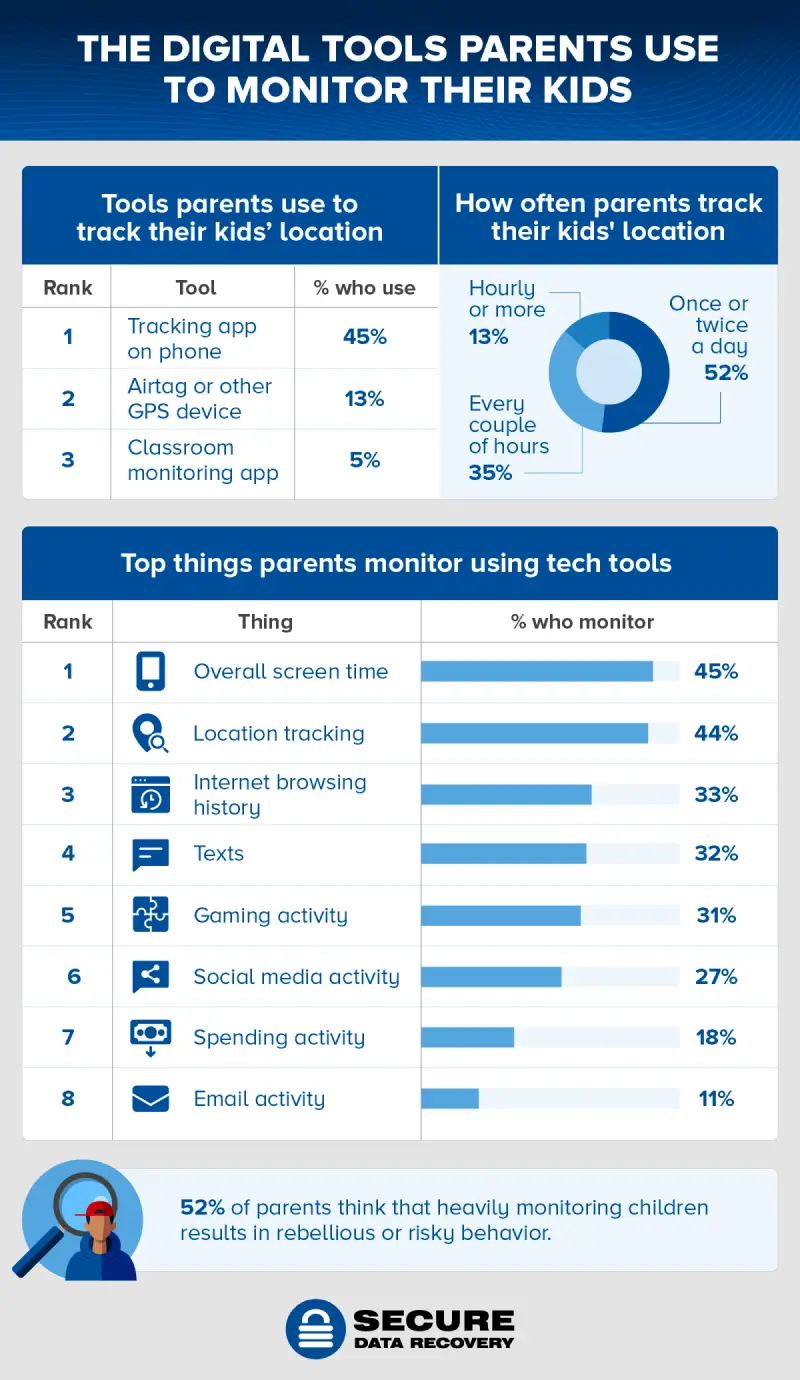
The top digital monitoring tools parents use to track their kids are screen time monitors, location trackers, and internet browsing history trackers. With so many devices available to children, many parents view their kid's overall screen time to make sure they’re not spending too much time online. It’s also common for parents to set screen time limits, allowing children to use a device or app for only a certain amount of time each day or week.
Location tracking devices or apps are a huge tool that many parents use to stay updated on where their child is at all times. With many children being glued to their cell phones, using them to track their location can be helpful. This is why 45% of parents track their kids through a tracking app on their phone.
For parents who don’t want to be constantly refreshing their child’s current whereabouts, 20% have set up an alert to let them know if their child leaves a specific location. The majority of parents, 52%, track their child's location once or twice a day.
While parents log in to see where their child is currently, many of the children remain clueless, as 12% of parents say their child doesn’t know they can track their location. This is probably why 20% have caught their child going somewhere they weren’t supposed to by tracking their location.
Once parents feel the comfort of always knowing where their child is at all times, it can be hard to disconnect once a child becomes an adult. One in three parents say they track the location of their adult children.
Why and When Parents Check In
While independently checking their child’s location and monitoring their activity through technology devices can offer parents a quick update on their children, many parents still rely on physically checking in with their kids to see how they’re doing.
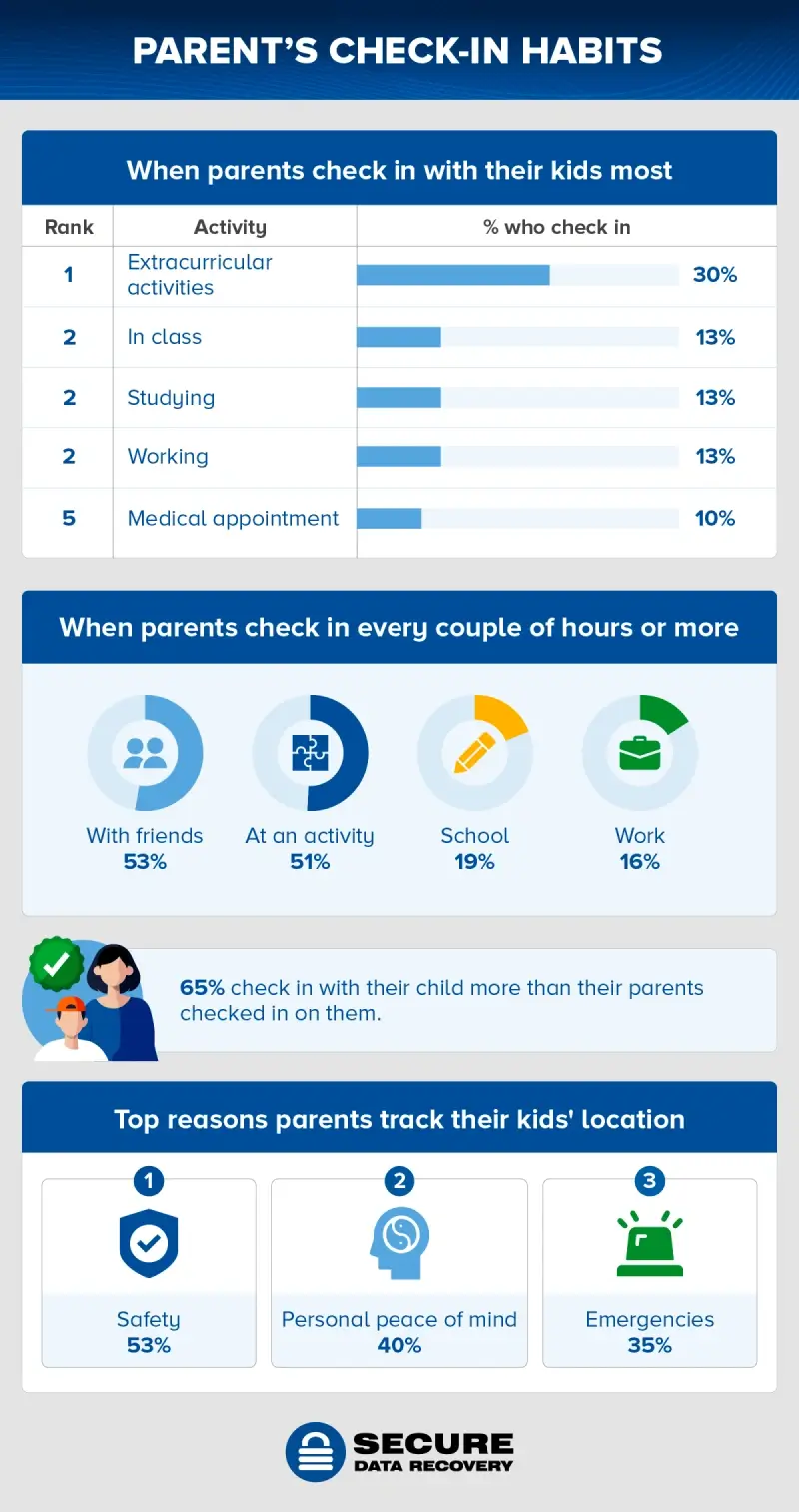
Whether it’s a quick text or a detailed phone call, many parents need to physically connect with their children to know they’re doing well. Today’s parents do so more than their previous generation, as 65% say they check in with their children more than their parents checked in on them.
The likelihood of a parent checking in, depends on where their child is at. Most parents check in when their child is doing extracurricular activities, in class, and studying. Although many schools have a “no phone” policy to encourage kids to stay focused on their schoolwork, 21% have told their child to defy that rule and always keep their phone on.
The frequency of their check in’s also depends on who their child is with or where their child is at, and over half of parents check in every couple of hours or more when their child is with their friends.
While certain tools can give parents peace of mind, they can also cause some worry, 28% have been concerned that the tools they use to monitor their child can be compromised. An all-too-common occurrence is hackers hijacking a video feed from a security camera, which allows them to view or listen in on private moments. Similarly, some parents may worry about location tracking apps being compromised, which would allow someone to potentially stalk their child’s location in real time.
Someone else knowing your child’s location can sometimes be done without the need for hijacking, as it’s trendy for kids nowadays to constantly share their location with their friends. Because of that trend, 17% of parents say their child shares their location with someone who isn’t their parent, and 15% don’t know who their child shares their location with.
Ultimately, parents just want their kids to be safe. When asked the top reason why they track their child’s location, 53% said it was for safety reasons. The second most common reason is for their personal peace of mind, and the third is for emergencies.
Securing Your Family’s Digital Footprint with Secure Data Recovery
As technology continues to evolve, so does the way parents monitor and protect their children. While technology tracking tools can give parents much-needed peace of mind, they also come with their own set of challenges when it comes to protecting the data they generate.
At Secure Data Recovery, we know how crucial it is to protect the sensitive information stored on your family's devices. Whether the SD card on your monitoring devices fails, you need laptop data recovery, or your teen damages their iPhone and is in need of iPhone data recovery services, our team can help. We offer free quotes to help you with any of your data recovery needs.
Methodology
In November 2024, we surveyed 2,009 Americans about how they monitor their children using technology. Respondents ranged in age from 18 to 76 years old, and were 52% female and 48% male.
To calculate the Parental Monitoring Score, we looked at survey answers to questions like "How do you use technology to monitor your child?", "How often do you check in with your child by text or phone when they're not with you?", and "Do you track your child’s location using any of the following?", among others. We gave each answer a point value based on how much monitoring was involved. Then, we added up the points for each person to get their individual score. Finally, we averaged the scores of all respondents in each state to find the average score for that state.

